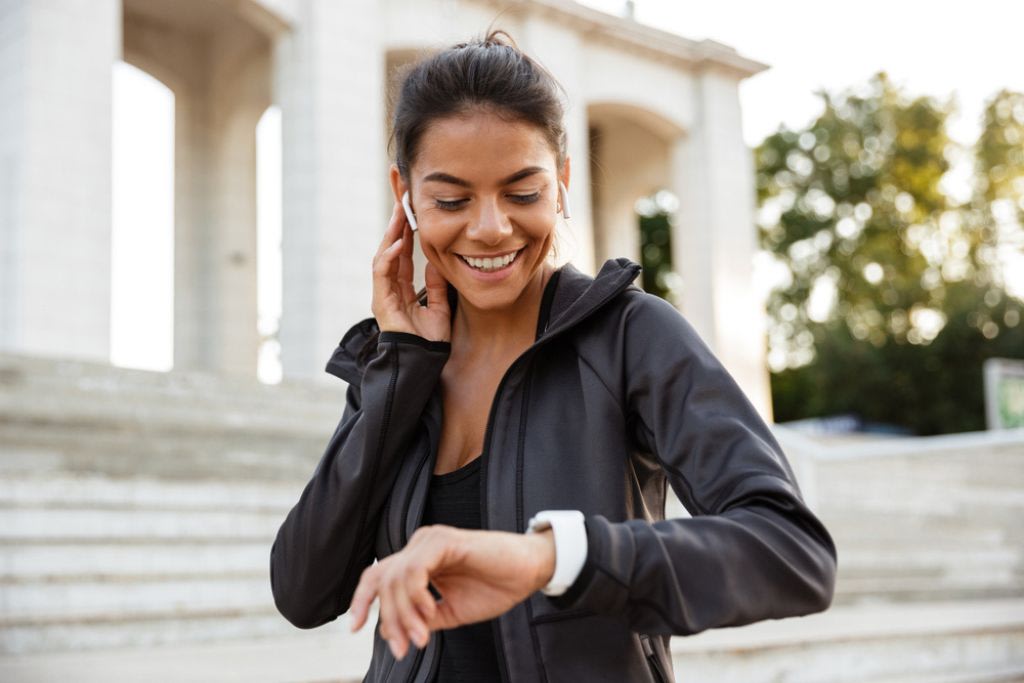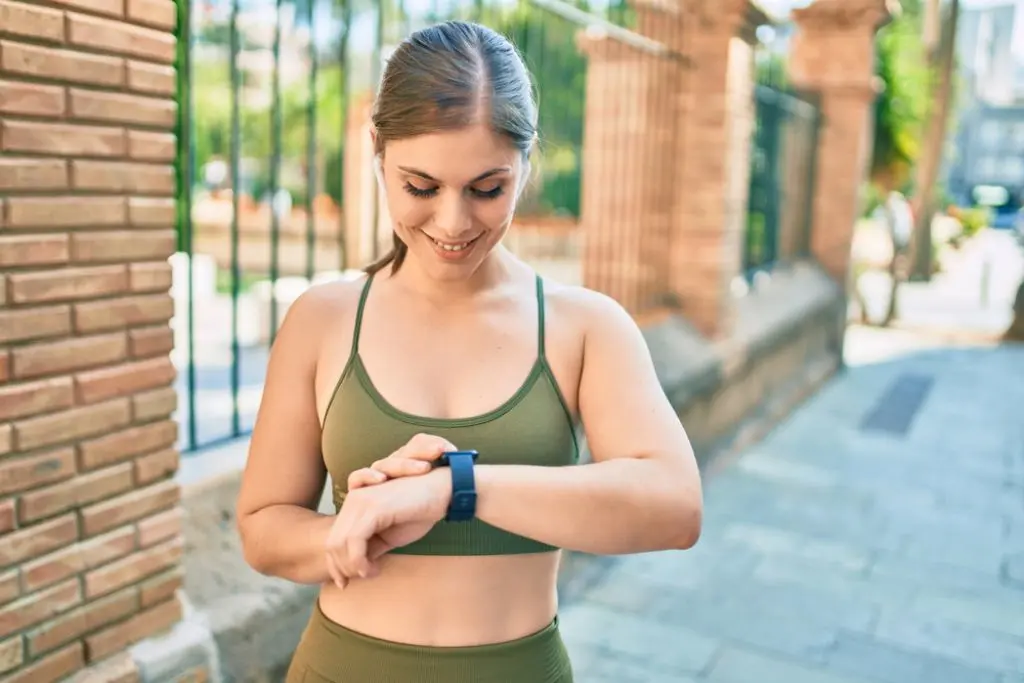Do Fitness Trackers Actually Improve Your Health?

May 2, 2023 - Updated September 2, 2024

Head out for a walk, take a trip to the supermarket or go out for a meal, and finding a person wearing a fitness tracker or smartwatch won’t be a difficult task. Harvard Health even says about one in five people has one!
Whether you get a kick out of tracking your step count, logging your workouts, matching your training to your menstrual cycle, monitoring your sleep patterns or measuring your heart rate, we know that so many women in the Sweat Community love their smartwatches, and we began to wonder - can a fitness tracker actually improve your health?
When statistics forecasts are showing worldwide smartwatch shipments are set to increase from 37 million units in 2016 to over 402 million units by 2027, we were curious to find out how much of an impact they can actually have on your health.
Getting you moving and keeping you moving
According to John Hopkins Medicine, studies show that consistently using a fitness tracker - whether it’s a traditional pedometer, smartwatch or another wearable device - can increase your daily steps by more than a mile, especially if you’ve set yourself a daily goal.
Having easy access to data about your daily movement habits can also be a huge eye-opener if you’re not getting much exercise, and provide you with information and encouragement to start making healthy and empowering changes to your routine.
A 2022 review published in The Lancet set out to examine the effectiveness of activity trackers for improving physical activity and related physiological and psychosocial outcomes, with results taken from 163,992 participants ranging in age and health status.
Their findings suggest activity trackers do improve physical activity, body composition and fitness, with approximately 1800 extra steps taken per day, 40 extra minutes of walking and a daily six-minute increase in moderate to vigorous physical activity (HIIT workout, anyone?).
Even better, these improvements aren’t just short-term benefits that only last a week - they appear to last for at least six months while promoting empowering health habits like goal-setting and accountability.
Researchers also point out the benefits of focusing on metrics like daily step count and overall standing or moving time, as these encourage a more active lifestyle and reduce the barriers associated with structured forms of exercise like a workout or run. They can be a great way to help make exercise snacks part of your daily routine.
Feeling mentally drained and struggling to get through your workout? Another study from 2022 has also shown that providing visual performance feedback to a mentally fatigued person can mitigate the negative effects of the fatigue on their physical endurance. This explains why it can be so encouraging to look at your watch and check in on your performance mid-workout!

A feeling of achievement
Aside from the information a fitness tracker gives you, it can also provide an incentive to move your body and create healthy habits.
As John Hopkins Medicine highlights, most wearable devices allow you to set a daily movement goal - a great tool for encouraging an active lifestyle. The most common goal is 10,000 daily steps, but different trackers have their own unique features for the goal-getters among us. Not sure how many steps a day you should be aiming for? Around 5,000 to 8,000 is enough to experience the benefits of walking.
Some fitness watches also allow you to connect with friends, family and workout buddies for accountability (or a bit of friendly competition!), while others let you set goals for activities such as standing time, PBs, workouts completed or exercise streaks.
If smashing goals is what gets you going and keeps you going, fitness trackers can do wonders for your health and overall wellbeing.
See and celebrate your progress
One randomised controlled trial from 2023 aimed to understand the effects of fitness trackers on behaviour and health, with 162 adults recording their daily steps for five weeks while wearing a fitness watch. Each participant either received an accurate step count, a 40% deflated step count, or a 40% inflated step count.
What did they find? Those receiving the accurate step counts perceived their physical activity as healthier, adopted a healthier diet and experienced improved mental health compared to the deflated step count group. This group perceived their physical activity as inadequate, ate less healthy foods and experienced negative effects in regard to their self-esteem, mental health, blood pressure and heart rate. This trial was consistent with similar findings from a 2019 review published in the American Journal of Medicine.
Another 2022 research review published in International Journal of Behavioral Nutrition and Physical Activity found step-count monitoring leads to both short and long-term increases in daily steps, and we love that the researchers also mentioned there are no clear advantage of choosing newer devices over simple pedometers. It doesn’t matter if your fitness tracker is fancy or basic, expensive or cheap - they all do the trick!
If you find it motivating and meaningful to track your steps but are currently using your phone, Harvard Health points out that a fitness watch could be something to consider. Unless your phone is in your hand every waking moment of the day (we hope not), a smartwatch or fitness tracker will be far more accurate.
It can also be motivating to see your health data improve over time, whether it’s your average daily step count, resting heart rate, sleep quality, running or walking pace, or cardiovascular fitness.

A lot of hits, but a few misses
Tracking your step count is the basic function of a fitness tracker, but depending on what your wearable device offers in the way of features, you might also be able to track things such as your sleep patterns, menstrual cycle, stress levels, heart rate zones, recovery, blood oxygen levels and calories burned.
Stanford Medicine says if you’re using a wearable device to measure your steps or heart rate, it’s probably doing a pretty good job as these are both measured directly. However, you might not want to pay too much attention to your energy expenditure, aka calories burned, as each device has its own algorithms which don’t take into consideration every aspect of an individual.
An evaluation of seven different devices worn by a diverse group of 60 volunteers found six of the devices had an error rate of less than 5% for heart rate measurements, but no device managed to accurately measure energy expenditure. The most accurate device was still off by an average of 27%, and the least accurate was off by a whopping 93%.
We don’t believe that exercising to burn calories is an empowering source of motivation, and knowing how inaccurate the numbers are is even more reason to get excited by performance goals or how good your workouts make you feel instead.
Trackers aren’t for everyone
If you don’t have a fitness tracker and don’t want one - that’s absolutely fine! They’re definitely not a must-have when it comes to smashing your workouts, achieving your goals and being in good health. For some people, the numbers and constant goals can be a source of pressure, stress or guilt, you might not want another device to worry about, or the motivation and measurements provided by a fitness tracker simply don't resonate with you.
It’s important to remember, a wearable device should feel like a source of support and encouragement, not a punishment or source of obligation. Are you finding that you don’t feel good unless you hit your targets or that you ignore your body’s calls for rest in order to get your stats up? Take a break from using your tracker and reevaluate why you move. Getting sweaty is all about feeling good, and the mental rewards are just as important as the physical benefits.
If you have (or want) a smartwatch but are only interested in using it for fitness purposes, you can choose not to connect your device to your phone or turn notifications off. It also pays to do your research and find one that fits your needs, training style and price range. The best fitness tracker will be unique to you!
While there are plenty of ways to track your fitness progress or boost your levels of motivation, for many people fitness trackers provide a handy tool that does both. Even better - the data shows they can have real, positive effects on your health and wellbeing!

Erin is a writer and editor at Sweat with years of experience in women's publishing, the fitness industry, media and tech. She's passionate about the power of movement, and you can often find her on a yoga mat, a hike, a dance floor, in the ocean or the gym.
* Disclaimer: This blog post is not intended to replace the advice of a medical professional. The above information should not be used to diagnose, treat, or prevent any disease or medical condition. Please consult your doctor before making any changes to your diet, sleep methods, daily activity, or fitness routine. Sweat assumes no responsibility for any personal injury or damage sustained by any recommendations, opinions, or advice given in this article.
Fitness